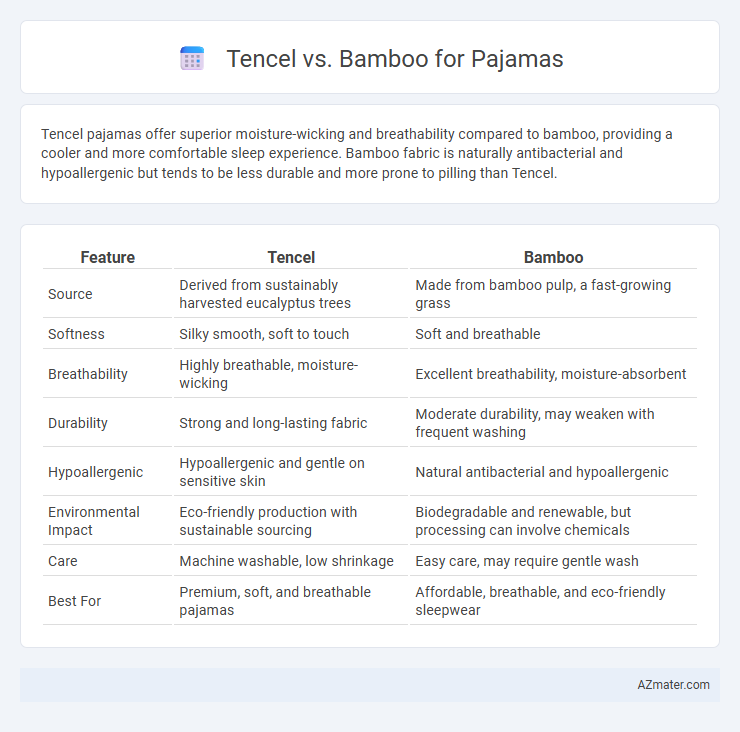Tencel pajamas offer superior moisture-wicking and breathability compared to bamboo, providing a cooler and more comfortable sleep experience. Bamboo fabric is naturally antibacterial and hypoallergenic but tends to be less durable and more prone to pilling than Tencel.
Table of Comparison
| Feature | Tencel | Bamboo |
|---|---|---|
| Source | Derived from sustainably harvested eucalyptus trees | Made from bamboo pulp, a fast-growing grass |
| Softness | Silky smooth, soft to touch | Soft and breathable |
| Breathability | Highly breathable, moisture-wicking | Excellent breathability, moisture-absorbent |
| Durability | Strong and long-lasting fabric | Moderate durability, may weaken with frequent washing |
| Hypoallergenic | Hypoallergenic and gentle on sensitive skin | Natural antibacterial and hypoallergenic |
| Environmental Impact | Eco-friendly production with sustainable sourcing | Biodegradable and renewable, but processing can involve chemicals |
| Care | Machine washable, low shrinkage | Easy care, may require gentle wash |
| Best For | Premium, soft, and breathable pajamas | Affordable, breathable, and eco-friendly sleepwear |
Introduction to Tencel and Bamboo Fabrics
Tencel, derived from sustainably sourced eucalyptus wood, offers a smooth, breathable, and moisture-wicking fabric ideal for pajamas. Bamboo fabric, made from bamboo pulp, is known for its natural antibacterial properties, softness, and eco-friendly cultivation. Both fabrics provide comfort and sustainability, but their different textures and environmental impacts influence pajama choices.
How Tencel and Bamboo Are Made
Tencel is produced through a sustainable process involving the chemical treatment of wood pulp, primarily from eucalyptus trees, resulting in soft, breathable fibers ideal for pajamas. Bamboo fabric is created by mechanically crushing bamboo stalks and using natural enzymes or chemically converting bamboo pulp into a viscose fiber, offering moisture-wicking and antibacterial properties. Both materials undergo eco-friendly manufacturing methods that emphasize sustainability and comfort, making them popular choices for sleepwear.
Softness and Comfort Comparison
Tencel pajamas offer exceptional softness due to their smooth fibers made from sustainably sourced wood pulp, providing a silky feel that is gentle on the skin. Bamboo fabric, known for its natural moisture-wicking and hypoallergenic properties, delivers a breathable and cool comfort ideal for sensitive skin and warmer climates. Both materials excel in softness and comfort, but Tencel tends to be smoother and more luxurious, while bamboo emphasizes breathability and temperature regulation.
Breathability and Temperature Regulation
Tencel pajamas offer superior breathability due to their moisture-wicking properties, effectively drawing sweat away from the skin to keep sleepers dry and comfortable. Bamboo fabric excels in temperature regulation by naturally maintaining a cool feel, making it ideal for warm climates. Both fibers are eco-friendly but Tencel's advanced fiber structure provides enhanced airflow and thermal management benefits compared to bamboo.
Moisture-Wicking Properties
Tencel fabric offers superior moisture-wicking properties due to its cellulose fiber structure, which efficiently absorbs and evaporates sweat, keeping skin dry and comfortable during sleep. Bamboo pajamas provide natural breathability and moderate moisture-wicking, but tend to retain more moisture compared to Tencel, potentially leading to less effective cooling. For optimal moisture management in sleepwear, Tencel stands out as the preferred choice over bamboo, especially in warm or humid conditions.
Eco-Friendliness and Sustainability
Tencel pajamas are produced from sustainably sourced eucalyptus trees using an environmentally responsible closed-loop process that recycles water and solvents, minimizing waste and reducing environmental impact. Bamboo pajamas offer natural antibacterial properties and biodegradability but often involve chemical-intensive processing methods that can harm ecosystems if not managed responsibly. Choosing Tencel supports eco-friendliness through renewable raw materials and low-impact manufacturing, whereas bamboo's sustainability benefits depend heavily on the production techniques employed.
Durability and Longevity
Tencel pajamas exhibit superior durability due to their lyocell fiber structure, which resists pilling and maintains strength after multiple washes. Bamboo fabric, while naturally antimicrobial and soft, tends to weaken over time because of its mechanical and chemical processing methods. Investing in Tencel sleepwear ensures longer-lasting comfort and sustained fabric integrity compared to bamboo options.
Skin Sensitivity and Hypoallergenic Qualities
Tencel fibers, derived from sustainably sourced eucalyptus trees, offer superior moisture-wicking properties and breathability that reduce irritation for sensitive skin compared to bamboo fabric. Bamboo pajamas, while naturally antibacterial, may lose these hypoallergenic benefits due to chemical processing involved in turning bamboo into viscose fibers. Opting for Tencel pajama fabric supports irritation-free comfort with a lower allergen potential, making it a preferable choice for those with skin sensitivities.
Care and Maintenance Differences
Tencel pajamas require gentle machine washing with cold water and mild detergent to preserve their smooth texture and moisture-wicking properties, avoiding bleach and tumble drying. Bamboo pajamas, known for natural antibacterial qualities, also need cold water wash but can benefit from air drying to maintain fabric integrity and color vibrancy. Both fabrics demand low-heat ironing if necessary, but Tencel typically exhibits greater wrinkle resistance, reducing the frequency of ironing compared to bamboo.
Price and Value for Pajama Shoppers
Tencel pajamas often come at a higher price point due to their sustainable production process and superior moisture-wicking properties, offering exceptional durability and comfort. Bamboo pajamas tend to be more affordable, providing softness and natural breathability but may lack the same level of long-term resilience as Tencel. Pajama shoppers seeking the best value balance cost with fabric benefits, favoring Tencel for longevity and bamboo for budget-friendly options.

Infographic: Tencel vs Bamboo for Pajama
 azmater.com
azmater.com